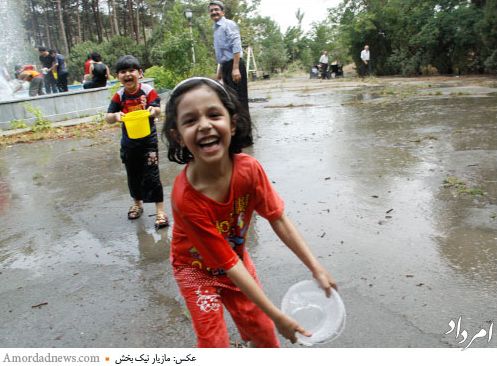
Publisher:
Bonnie King
CONTACT:
Newsroom@Salem-news.com
Advertising:
Adsales@Salem-news.com

~Truth~
~Justice~
~Peace~
TJP
Jul-21-2012 16:25

 TweetFollow @OregonNews
TweetFollow @OregonNews
The Tirgan Festival and the Waters We Sprinkle on Each Other
Nasrin Pourhamrang for Salem-News.comThe festival of Tirgan or Āb-Pāshān enjoys close links with the developments of nature, religious beliefs, historical events and the myths of Persia.
 Chidren enjoying the Tirgan Festival in Iran |
(TEHRAN) - Maybe you don't want to be targeted with vinegary and sour fruits such as orange while passing by the street, like what is annually done in a festival in Italy in which people throw oranges toward each other. Similarly, you may dislike being painted from head to foot by rotten tomatoes, as do the Spaniards in their annual festival. Even throwing bright colors which is popular among the Hindus may be unfavorable for many people, because it makes their clothes unusable. Take, for example, throwing pillows which causes problems for those with allergies. Moreover, cleaning the cities and removing the remnants and traces of oranges, rotten tomatoes, colors and pillows seems quite problematic for the street sweepers and municipality workers.
However, imagine that in one of the hot days of summer, i.e. July 3, you're invited to a "water-sprinkling" festival in a city park and are able to enjoy the day cheering and sprinkling waters on others along with a lot of happy people and children who have come to celebrate a joyous day. It can be easily visualized that playing with water in a hot summer day in a beautiful city park together with a host of delighted citizens can be quite blissful and fantastic.
 |
Maybe you haven't heard the name of the "Āb-Pāshān" or "water-sprinkling" festival; a national feast which has been celebrated in ancient Iran, dating back to a few thousand years ago. All the national festivals of Iran have a few-thousand-year history, which is since at least 10,000 years ago when the Iranian civilization took shape in the Persian Plateau.
The Iranian calendar in the ancient time was resplendent with days and weeks which the people believed were virtuous and full of blessing and should be commemorated. All of these celebrations were somehow interrelated with the transition of the seasons and the transformations of the nature, representing the connection of the people's lives with the nature. Such great festivities such as Nowrouz, Mehregan, Tirgan, Sedeh, Yalda, Chahrshanbe-Souri and a number of other festivals which were held each month were related to the nature, the changing of the seasons and their impact on the life of the people. However, the philosophy of celebrating such festivals was not confined to the close interrelationship between people and nature and their respect for the nature. Myths, historical events, religious beliefs and rituals were similarly important in forming these rites and festivals.
The festival of Tirgan or Āb-Pāshān enjoys close links with the developments of the nature, religious beliefs, historical events and the myths of Persia. In the day of Tirgan or Āb-Pāshān festival, people would venerate the Sirius star (driven from a Greek word) as the goddess of rain so that the sky starts to shower and satiates the thirsty lands and farms. In order to provoke the rain-bearing clouds, they would sprinkle water toward the sky to instigate the jealousy of the clouds and make them rain.
However, Tirgan has its roots in the historical incidents and mythologies of Iran. According to people's beliefs, in this day, the Persian army led by Manuchehr, an ancient Iranian emperor, concluded a peace agreement with Afrasyab, the king of Turan dynasty that was the enemy of Iran. According to this treaty, it was agreed that someone from the Persian army should throw an arrow; wherever the arrow fell on the ground, there will be the border of Iran-Turan. The Iranian king conferred this responsibility to an audacious warrior named Arash. Arash exerted every effort and gathered all his strength to have the Iranian territory expanded more than before. After firing the arrow, Arash's body got disintegrated and eventually he sacrificed his life over broadening the frontiers of Iran. It's said that the arrow traveled for half of a day and finally landed in the Eastern Iran in the Khorasan region which became the border between Iran and Turan. Since that time, the people started to celebrate and worship the Almighty God on this day which had become a symbol of peace and an end to the longstanding war.
 |
But the Tirgan festival has yet another basis and philosophy for the Iranians, which is the adoration of authors and writers. Perhaps, it's impossible to find a few-thousand-year background of adoring the position of authors and expressing thanksgiving to them in the history of a nation. Honoring the authors in Iran returns to old times and the era of Housahng, the second mythological king of Ancient Persia. In this day, a special ceremony was held for esteeming the authors and writers of the court and they were presented with valuable gifts. For the same occasion, July 3 is today called the Day of Pen in Iran and different ceremonies are held in cultural circles and institutions to honor the elevated position of the authors.
Despite its ancient age, Tirgan festival is still observed in some of the cities and villages in Iran. The Iranian Zoroastrians, in particular, celebrate this festival in the same way their ancestors did. They wear new clothes, cook different pastries, say prayers and the children splash water on each other.
It seems that Tirgan is a festival which cannot and should not be limited to the borders of Iran and people around the world can celebrate it in their living environment if they take into consideration the fundamental concepts of the philosophy of this ceremony. Asking for rainfall from the goddess of the skies to quench the thirsty lands, honoring the soldiers who have lost their lives in the path of preserving the independence and sovereignty of their country and esteeming the authors who are the guardians of the culture in each society are the pillars which can be accepted and desired by all the nations around the world.
(Our special thanks to Nasrin Pourhamrang for sharing this wonderful vision of Iran's Tirgan Festival. It is another reminder of how similar this world's societies are, however displaced they may be.)
Also by Nasrin Pourhamrang:
Interview with Alexander Ahndoril, Swedish novelist - By Nasrin Pourhamrang for Salem-News.com
 |
 |
 |
 |
 |
 |
 |
Articles for July 20, 2012 | Articles for July 21, 2012 | Articles for July 22, 2012


Salem-News.com:

Quick Links
DINING
Willamette UniversityGoudy Commons Cafe
Dine on the Queen
Willamette Queen Sternwheeler
MUST SEE SALEM
Oregon Capitol ToursCapitol History Gateway
Willamette River Ride
Willamette Queen Sternwheeler
Historic Home Tours:
Deepwood Museum
The Bush House
Gaiety Hollow Garden
AUCTIONS - APPRAISALS
Auction Masters & AppraisalsCONSTRUCTION SERVICES
Roofing and ContractingSheridan, Ore.
ONLINE SHOPPING
Special Occasion DressesAdvertise with Salem-News
Contact:AdSales@Salem-News.com

Terms of Service | Privacy Policy
All comments and messages are approved by people and self promotional links or unacceptable comments are denied.
[Return to Top]
©2026 Salem-News.com. All opinions expressed in this article are those of the author and do not necessarily reflect those of Salem-News.com.